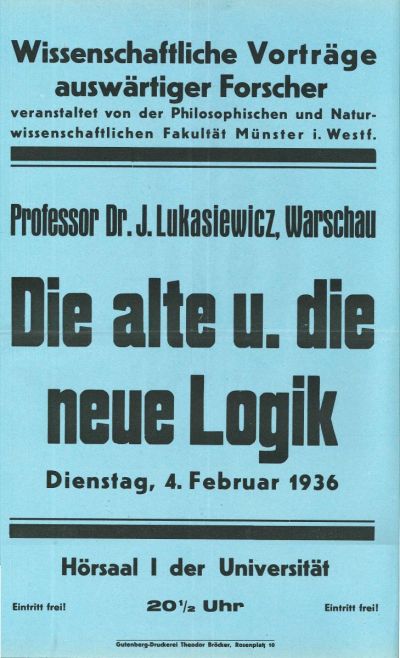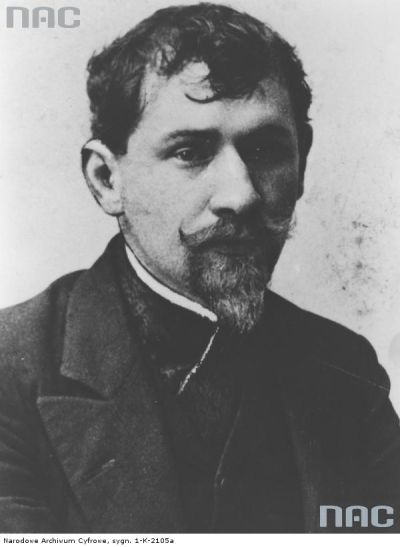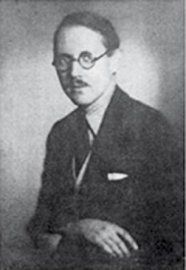Jan Łukasiewicz

It is a more than astounding fact that a former Polish Ministry of education and rector of Warsaw University was awarded an honorary doctorate in Nazi Germany in 1938. Furthermore he was still lecturing at Münster University in spring 1936; and last not least he survived the final years of the war with the support of friendly German mathematicians.
Jan Leopold Łukasiewicz was born on 21st December 1878 in Lemberg (Lwów), the then capital of the Austrian province of Galicia. Even though his father Paweł was a captain in the Austrian army and his mother Leopoldine, the daughter of an Austrian civil servant, the family only spoke Polish at home. After completing his studies at the humanist grammar school in 1887 he first read law, then mathematics and philosophy in Lemberg. He studied for a doctorate under Kazimierz Twardowski and was awarded his Ph.D. title in 1902 with a special mention “sub auspiciis Imperatoris” (under the auspices of the Kaiser), as well as receiving a doctorate ring studded with diamonds from Kaiser Franz Joseph I. Between 1902 and 1906 Łukasiewicz continued his philosophical studies abroad, especially in Berlin and Leuven. In 1906 he qualified as a university professor in Lemberg, where he was a freelance lecturer until he was appointed an associate professor in 1911.
In 1915 the Central Powers (the German Reich and Austria-Hungary) appointed him to the reopened Warsaw University. In 1918 he was made a ministerial director in the Polish Ministry of Education and from January to December 1919 he was the Minister of Education in Paderewski’s cabinet. Łukasiewicz was a professor for mathematical logic and basic research at Warsaw University from 1920 until the German invasion of Poland in September 1939. During this time he was elected Rector of the University on two occasions (1922/23 and 1931/32). Along with Stanisław Leśniewski, Łukasiewicz was one of the leading minds in the famous Lemberg-Warsaw School of Logic and Scientific Theory, which also included such outstanding academics as Alfred Tarski and Andrzej Mostowski. Łukasiewicz’s students included Mordechaj Wajsberg, Zygmunt Kobrzyński, Stanisław Jaśkowski, Bolesław Sobociński, Jerzy Słupecki and Józef Maria Bocheński.
One of Łukasiewicz’s closest friends was the German theologian and mathematician Heinrich Scholz (1884-1956), who held the first chair of mathematical logic in Germany at the University of Münster. The two logicians upheld an intensive exchange of academic knowledge between Munster and Warsaw. This was linked with mutual lecture journeys and joint research projects. In February Łukasiewicz was invited to give four highly esteemed lectures by the faculty of philosophy and natural sciences at the University of Minster. On 20th December 1938, amid increasing German-Polish tensions, Łukasiewicz was awarded an honorary doctorate by the faculty of philosophy at the University of Münster for services to establishing mathematical logic in Germany and the mathematician Gottlob Frege. The German ambassador Hans Adolf von Moltke awarded him the honorary certificate at an official ceremony in the German Embassy in Warsaw. The notabilities present at the ceremony included the rector of Warsaw University and other prominent representatives from the academic and political worlds, as well as Adolf Kratzer, the Dean of the faculty of philosophy at the University of Minster, and Heinrich Scholz.
Łukasiewicz’s apartment in Warsaw was completely wiped out by German bombardments in September 1939, and his complete library, correspondence and manuscripts were all destroyed by fire. With his wife Regina Barwińska he managed to find a provisional home in a boarding house for academics. Since the University had been closed by the German occupation forces Łukasiewicz was also in a very precarious financial situation. Thanks to help from Heinrich Scholz, the philosopher Jürgen von Kempski and others, Łukasiewicz managed to find a post as a translator at the Warsaw City Archive. In addition he received financial help from Scholz via the German Red Cross. On Scholz’s initiative he was also offered a post at the so-called “Institute for German East Work” but he turned this down on political grounds. Łukasiewicz taught secretly at the Warsaw Underground University (Tajny Uniwersytet Warszawski).
During the war years Heinrich Scholz also worked to ensure the release of the Kraków theology professor Jan Salamucha from the concentration camp in Oranienburg, and the Kraków philosopher of science Joachim Metallmann from the camp in Buchenwald. Because of his commitment he was given a harsh reprimand by the then Minister of Science who threatened him with the sack.
Since Łukasiewicz’s wife belonged to the Polish aristocracy and he himself was a former Minister of Education and dignitary (amongst others he had been awarded the Order of Polonia Restituta) they belonged to a group of persons who were threatened with reparations, even execution after Poland was occupied by the Red Army in autumn 1943. As a result Łukasiewicz made preparations to flee from Poland in an emergency. As can be seen from an exchange of letters between Łukasiewicz and Scholz Łukasiewicz was planning to move to Switzerland. The first step along the way was to be a brief stay in Germany. Since it was necessary to fulfil a huge number of official conditions to be allowed entry into the country Scholz took over the necessary preparations and consulted the authorities and the Chief Inspector of the Police in Münster. On the 17th July 1944, only a few days after the start of the Warsaw Uprising, Jan and Regina Łukasiewicz left Warsaw for Münster, where they arrived on the following day. The attempt on Hitler’s life on 20th July 1944 put paid to their onward journey to Switzerland because they were now forbidden to leave the German Reich. The Łukasiewicz’s remained in Münster with the support of their mathematician friends, living in the cellar of a bombed out house until Jürgen von Kempski brought them to his country farmhouse in Hembsen (district of Höxter) on 1st January 1945. Here they were liberated by American troops in April 1945.
A few days later Łukasiewicz received an invitation from the well-known Polish General, Leon Berbecki, the commander of the former prisoner-of-war camp for Polish officers (Oflag VI B) in Dössel. Łukasiewicz accepted the invitation and remained in Hohenwepel in the vicinity of Dössel until October 1945 where he taught logic in a Polish school that had been provisionally set up in the former camp in Dössel. For Łukasiewicz it was clear that he would never return to Poland since as a philosopher he refused to propagate dialectical materialism at a communist university. After a brief stay in Brussels he decided to emigrate to Ireland On 4th March 1946 he arrived in Dublin were he was greeted by the Irish Foreign Minister and Head of Government. In autumn 1946 Łukasiewicz was appointed Professor of Mathematical Logic at the Royal Irish Academy where he taught until 1953. He died on the 13th February 1956 in Dublin and was buried in the city’s Glasnevin cemetery. Łukasiewicz’s legacy can be found in the library of Manchester University.
In his obituary for Łukasiewicz Heinrich Scholz wrote: “A humanist under the sign of ‚Cogito, ergo sum’ during a time of the most severe challenges.”
Sabine Krämer, January 2015
Further reading:
Elstrodt, Jürgen; Schmitz, Norbert: Geschichte der Mathematik an der Universität Münster, 1773-1945, Münster 2008 (Available online at: http://wwwmath.uni-muenster.de/historie/)
Schmidt am Busch, Hans-Christoph; Wehmeier, Kai F.: Heinrich Scholz und Jan Łukasiewicz, in : Forum für osteuropäische Ideen- und Zeitgeschichte, 11. Jg. 2007, pp. 107-125
Woleński, Jan: Mathematical Logic in Warsaw: 1918-1939, in: Andrzej Mostowski and Foundational Studies, ed. V. A. Ehrenfeucht et al., pp. 30-46.
A detailed account of Łukasiewicz’s writing including a bibliography can be found at: http://plato.stanford.edu/entries/lukasiewicz/








